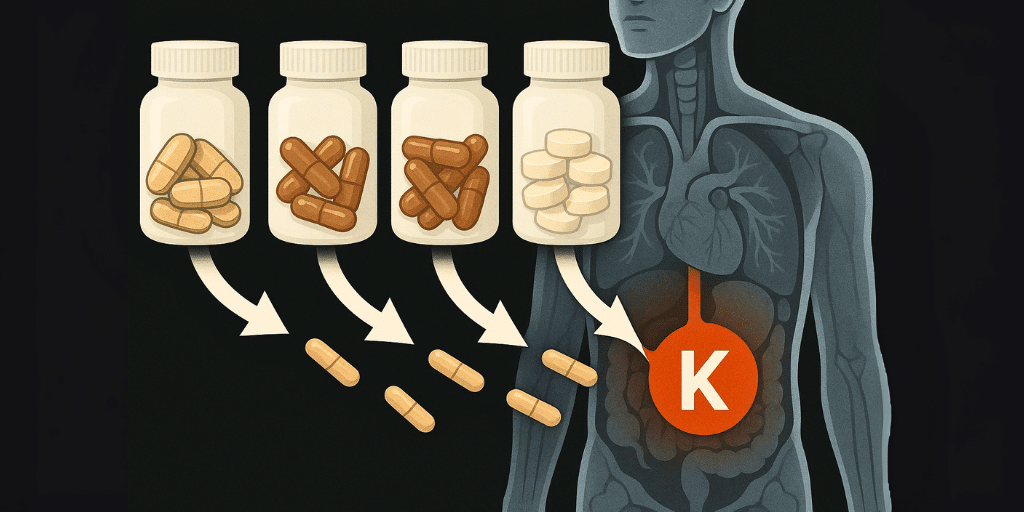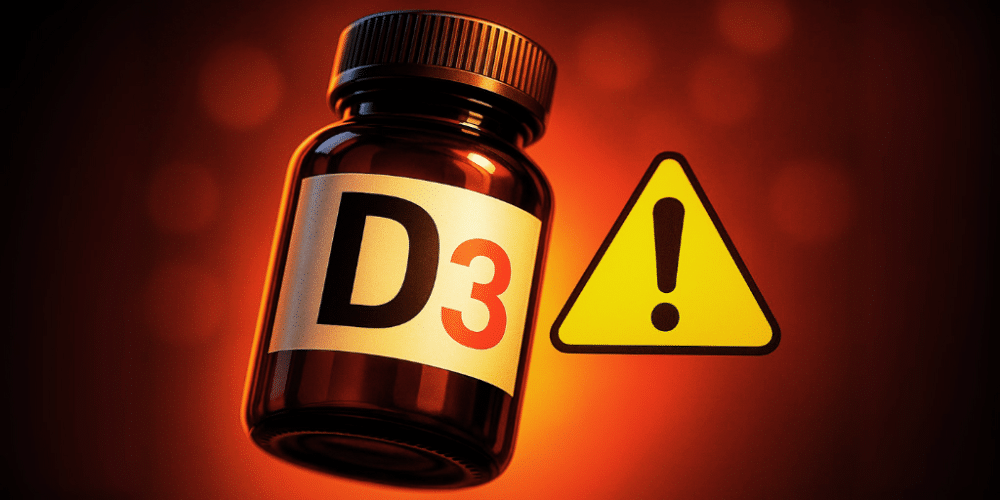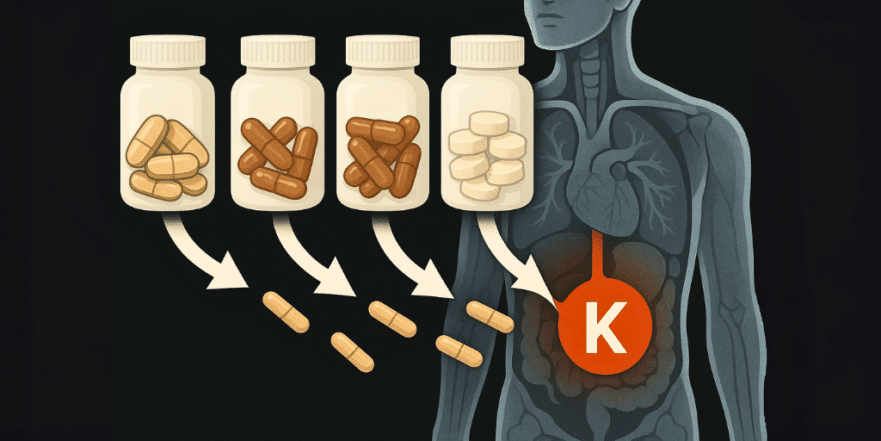
Did you know that some of the “healthy” supplements you’re taking could be the hidden reason you feel tired, have heart palpitations, or suffer from muscle cramps? It’s a frustrating situation. You’re trying to do something good for your body, but you end up feeling worse. The culprit might be a silent drain on one of your body’s most critical minerals: potassium.
A lot of people are already walking around with a potassium deficiency and don’t even know it. The symptoms are common and often blamed on other things—fatigue, muscle weakness, cramps, heart palpitations, and even constipation. You might not realize that certain supplements, while beneficial in their own right, can exacerbate this problem. This doesn’t mean these supplements are inherently bad, but it does mean you need to be smarter about how you use them. You need to be mindful of their effect on your potassium levels and perhaps even increase your potassium intake to maintain a healthy balance.
Potassium is one of the most important electrolytes in your body, essential for generating energy, conducting nerve signals, enabling muscle movement, maintaining a steady heart rhythm, and regulating fluid balance. Given that many modern diets are low in potassium-rich vegetables, the chances that your levels are already suboptimal are quite high. When you add chronic stress or high doses of certain supplements to the mix, you create a perfect storm for potassium depletion.
Key Takeaways
- Potassium is Vital: This essential electrolyte is crucial for your energy levels, nerve function, muscle health, and heart rhythm.
- Deficiency is Common: Many people don’t get enough potassium from their diet, leading to symptoms like fatigue, muscle cramps, and heart palpitations.
- Supplements Can Deplete Potassium: Certain common supplements, including sodium, calcium, high-dose vitamin D, and even vitamin B12, can lower your body’s potassium levels.
- Other Drains Exist: Things like laxatives, baking soda, and diuretics (including coffee) can also flush potassium out of your system.
- Balance is Everything: The key isn’t to stop taking these supplements but to be aware of their effects and ensure you’re balancing them with adequate potassium and magnesium intake, as well as managing stress.
1. Sodium: Potassium’s Direct Opponent

When it comes to potassium balance, sodium is the most obvious antagonist. Think of sodium and potassium as two kids on a seesaw. Your body works tirelessly to keep them in balance using a mechanism called the sodium-potassium pump. This cellular pump’s main job is to keep sodium outside your cells and potassium inside your cells. When your sodium intake goes way up, it throws this delicate balance off, and your potassium levels tend to go down.
If you’re consuming a diet high in processed foods, which are notoriously packed with sodium, or if you’re taking electrolyte powders that are heavily skewed towards sodium, you can start pushing potassium out of your cells. The more sodium your body retains, the more potassium you can lose through your urine. This process is governed by an adrenal hormone called aldosterone. During times of acute stress—the classic ‘fight or flight’ response—your body releases more aldosterone. This hormone signals your kidneys to hold on to sodium, which helps raise your blood pressure and retain water, giving you the resources to deal with the stressor. However, in our modern world of chronic stress, aldosterone levels can remain elevated, leading to continuous sodium retention and potassium loss. Over time, this chronic imbalance can disrupt the function of your nerves, muscles, and heart. Therefore, if you’re supplementing with sodium, you must be extra vigilant about getting enough potassium to counterbalance its effects.
2. Calcium: The Sneaky Antagonist

Everyone knows that calcium is good for bones and teeth, often working in tandem with magnesium. What you might not know is that calcium is also a potassium antagonist. While it’s not a direct opponent in the same way sodium is, it significantly interferes with how potassium functions inside your cells. Similar to sodium, calcium is primarily an extracellular electrolyte, meaning it resides mostly outside your cells. It helps to balance potassium and magnesium, which are both primarily intracellular electrolytes.
When your calcium levels rise too high—often from taking high-dose calcium supplements or from high-dose vitamin D, which we’ll discuss next—your cells can become overloaded with calcium. Since calcium has a stimulatory effect on cells, this excess can lead to issues like muscle tightness, cramps, and even constipation. It’s crucial to understand that electrolytes don’t work in isolation. It’s always best to look at the ‘big four’ together: sodium and calcium outside the cell must be balanced by sufficient potassium and magnesium inside the cell. If you’re taking calcium supplements, especially in high doses, without ensuring your potassium and magnesium levels are adequate, you’re setting yourself up for an imbalance that can leave you feeling unwell, despite your best intentions.
3. Vitamin D: The Double-Edged Sword

Vitamin D is a perfect example of how something incredibly healthy can become problematic if you overdo it or fail to balance it properly. The issue with high-dose vitamin D supplementation is its powerful effect on calcium. Vitamin D significantly increases calcium absorption from your gut. As we just discussed, all that extra calcium can antagonize both magnesium and potassium, driving their levels down.
The more vitamin D you take, the more calcium gets absorbed into your bloodstream. This surplus of calcium then begins to crowd out potassium within your cells, disrupting their normal function. While many health-conscious individuals know that you need to take magnesium with vitamin D, the vitamin D-potassium connection is far less known. If you’ve started taking vitamin D and begin experiencing side effects like muscle weakness, twitching, heart palpitations, or water retention, it’s very likely an electrolyte issue. Many people mistakenly blame these symptoms on dehydration, poor sleep, or other factors, when the real problem is that their electrolytes have been thrown out of whack by too much vitamin D without enough potassium to maintain balance. Always be mindful of this connection, especially if you are taking doses above 5,000 IU of vitamin D daily.
4. Vitamin B12: The Temporary Thief

This one is a bit more complex, but equally important to understand. Vitamin B12 can temporarily lower your potassium levels, but this typically only happens under a specific circumstance: when you are actively treating a B12 deficiency. When you have a B12 deficiency, your body’s ability to produce new red blood cells is impaired. As you start supplementing and your B12 levels rise, your body kicks into high gear, producing a large number of new red blood cells to correct the anemia. This process is called erythropoiesis.
Here’s the catch: these brand-new red blood cells need a lot of potassium to form correctly. They essentially act like little vacuum cleaners, sucking potassium out of your bloodstream to fill themselves up. This can cause a sudden, temporary drop in your serum potassium levels, a condition known as hypokalemia. This doesn’t happen to everyone, but if you know you’re deficient in B12 and you begin a high-dose supplementation protocol, be on the lookout for low potassium symptoms, especially in the first few weeks of treatment. Don’t be alarmed if this happens; it’s often a sign that the B12 is working! The effect usually balances out over time, but in the meantime, consciously increasing your intake of potassium-rich foods can make a huge difference and help you avoid uncomfortable side effects.
5. Other Sneaky Potassium Drains

Beyond the main supplements, a few other common items can quietly drain your potassium reserves:
- Laxatives: Whether they are stimulant or osmotic, laxatives can cause your body to flush out electrolytes, including potassium, along with water and waste. Chronic use is a well-known cause of potassium deficiency, and a warning is often stated right on the product label.
- Baking Soda (Sodium Bicarbonate): Some people use baking soda as a home remedy for indigestion or as an alkalizing agent. However, it’s very high in sodium. As we’ve learned, high sodium intake can lead to potassium loss. It can also have a mild diuretic effect, increasing urination and flushing out more potassium.
- Diuretics: Anything that makes you urinate more can lead to potassium loss. This includes prescription diuretic medications (‘water pills’), but also natural diuretics. Your daily coffee, certain herbal teas (like dandelion or hibiscus), and over-the-counter water pills all increase urine output. Your kidneys don’t really discriminate when flushing out water; essential minerals like potassium often go right out with it.
How to Protect Your Potassium Levels
Simply taking a potassium supplement isn’t always the answer. Intake matters, but retention—how much potassium stays in your body—is just as important. Here are two key strategies to help your body hold on to this vital mineral.
First, you need to support your adrenal function by lowering stress. Your adrenal glands are the primary regulators of electrolytes. When you’re under chronic stress, overworked, or relying on too many stimulants, your adrenal function can suffer. People with severe adrenal fatigue almost always have low potassium, no matter how much they consume. This cellular deficiency often won’t show up on a standard blood test but may be revealed in a tissue mineral analysis. If you are constantly stressed, it’s highly likely your potassium is low. You must work on managing your stress before your electrolyte balance will truly improve.
Second, never forget the magnesium-potassium connection. Magnesium is required to actively pump potassium into your cells where it belongs. If your magnesium levels are low—which is just as common as potassium deficiency—your body simply cannot retain potassium effectively. This is why some people supplement with potassium but see no improvement in their symptoms. Low magnesium also makes you more sensitive to the effects of calcium, which, as we know, can push potassium out of cells. If you’re struggling to raise your potassium, make sure you’re also getting enough magnesium.
Conclusion
Navigating the world of supplements requires a bit of wisdom. It’s not about demonizing beneficial nutrients like vitamin D or calcium, but about understanding the beautiful, complex symphony of minerals in your body. The key is balance. By being aware of these potential potassium drains, you can supplement smarter. Pay attention to your body, prioritize a diet rich in potassium from whole foods like avocados, spinach, and sweet potatoes, manage your stress, and ensure your magnesium levels are optimal. By doing so, you empower your body to maintain its delicate electrolyte balance, allowing you to reap the benefits of your health efforts without the unwanted side effects.
Source: Felix Harder

